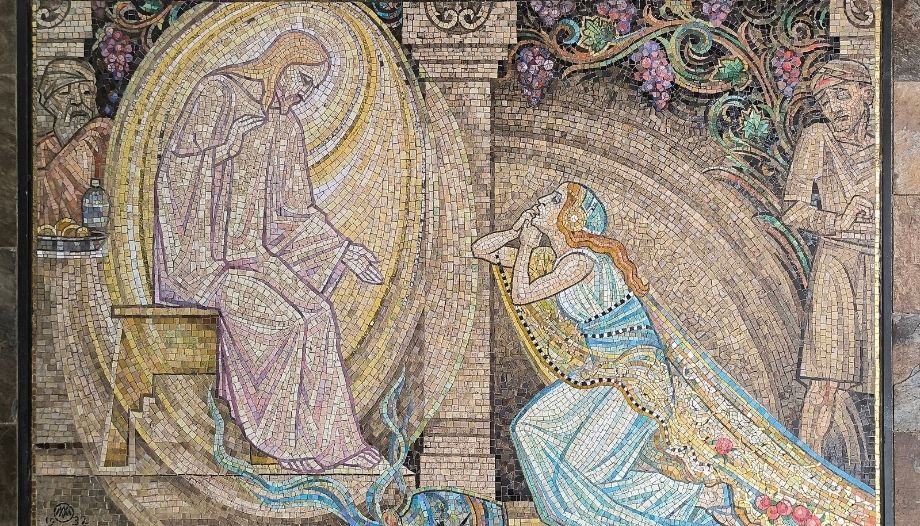In Jesus' time, two thousand years ago, women had no role to play. Neither then nor in all pre-Christian societies. But "in the history of God's friends, the role of women is the same as that of men," says lawyer Benigno Blanco in a podcast entitled 'The Role of Women'.The new influencers IIIcentered on Mary Magdalene, Jesus' disciple.
A similar thesis is formulated by María Blanco, professor of State Ecclesiastical Law at the University of Navarra, with an academic prism. In her work Women in the Church (2020), the jurist emphasizes that Jesus Christ "was the authentic generator and promoter of their dignity".
In a brief historical overview, Maria Blanco assures us that "the actions of Jesus Christ towards women were characterized by "an extraordinary transparency and depth". And she adds: "the strength of his behavior distills "the respect and honor due to women".
In his opinion, "the humanization brought about by Christianity is shown, among other things, in this appreciation of woman as what she is: a daughter of God, exactly the same as man".
God seeks friends
Benigno Blanco's exposition delves into details that allow us to observe why Jesus' behavior and view of women is truly revolutionary.
Throughout history, God has been looking for friends, to whom he has transmitted his message. He takes care of them, has a personalized relationship with them, and asks them to transmit the old Revelation of God to humanity.
Before Christ, it was Abraham, David, Moses..., who received and transmitted God's plans for humanity. This intensified when Christ became Man and came to earth. What God did on earth was to seek out a series of friends with whom He established a very special relationship, to whom He told His plans for mankind in a more intimate way. And He asked them, when He left this world, to continue transmitting, generation after generation, this message of God.
In the Old Testament tradition, unlike the Greek and Roman cultures, there are women who are protagonists. Mary, Moses' sister, Ruth, who gives her name to a Book, and some others.
Status of women in Greece, Rome and the Jewish world.
After talking about St. Peter in another podcast, Blanco focuses on Mary Magdalene, and launches some elementary ideas about the status of women in that society.
"In all pre-Christian societies, women did not play a role". We know quite a bit about Greece and Rome. Discrimination. Women had no role in public life, they were at home, except for being 'wife of', for example, wife of the emperor, and mother of his children.
A Greek writer of that time summarized the role of women in Athens as follows: "women are prostitutes for pleasure, and women to give us children". "Woman had no legal personality, and belonged to her father, and then to her husband", in Roman law. "In Jewish culture it was more or less the same".
Women had no role in public life, no culture, no politics, no such thing. Their role was reduced to the home. They could not trade and could not be witnesses in a trial. Benigno Blanco, a lawyer, refers to these details: it was necessary to obtain the coincident testimony of two or more women to know if they were telling the truth.
How Jesus acted with women
Jesus did not act with women like pre-Christian societies, Greece or Rome. "He was very rupturist," says Blanco. It is interesting to underline what we know about Jesus' dealings with women:
- He had female disciples, something that no Jewish rabbi had. It is known by the Torah, book of the law of the Jews. The Gospels narrate that Jesus was accompanied by his disciples, and also by a group of women, among whom was Mary Magdalene. "This was a novelty that must have scandalized the Jews of the time," says Benigno Blanco.
For example, the disciples were surprised to see him talking to a woman, the Samaritan woman, at the beginning of his public life, according to the Gospel. Jesus did not have the prejudices of the people of his time with regard to women.
Witnesses of the Resurrection
On the other hand, Jesus Christ performed numerous miracles in favor of women. The Gospel mentions the presence of Magdalene at the foot of the Cross, together with Mary, the Mother of Jesus, his mother's sister, Mary of Clopas, and St. John himself. And shortly after, it describes in detail the dialogue of the risen Jesus with her, which begins: "Woman, why are you weeping? And Jesus says: "Mary". And she: "Rabbuni, which means Master" (Jn 20).
She is the first witness to the Redemption of Jesus, although Benigno Blanco points out that, in his opinion, Jesus "had already appeared to his Mother Mary, according to an old tradition", although the Gospel does not mention it.
"Jesus was a breaker with the customs, the legal norms, the way women were treated in his time". The jurist Blanco cites examples, and highlights "the leading role of women in the origin of Christianity and of the Church, of women".
Synthesis of Jesus' revolution in 4 concepts
Jesus' ideas about women were revolutionary in giving them dignity, moral authority, and freedom by breaking with the cultural and religious norms of his time, which considered them inferior.
Jesus related to them in a direct and respectful way, included them in his circle of disciples, defended them before society (as in the episode of the adulterous woman) and made them important witnesses of his message and resurrection, as we have seen.
A. Dignity of women
Jesus demonstrated that women were not inferior, but persons created in the image of God with equal dignity and value to men.
Justice and compassion: Before the adulterous woman, Jesus defended her from condemnation and showed compassion, declaring that only he who was without sin cast the first stone. And they all went away. This restored her dignity and freed her from marginalization.
B. Place in society. Freedom
Women were direct interlocutors with Jesus. Breaking with custom, Jesus addressed women directly and publicly, something that scandalized his time.
Society of Jesus: Women formed part of his group of followers, traveling with him and playing a fundamental role in his ministry, which was unprecedented in his historical context.
C. Role in the Christian community. Privileged witnesses
Dignity and citizenship: Women recovered their dignity and moral authority, ceasing to be considered mere passive subjects and becoming active members.
The Samaritan woman: Jesus dialogued directly with her, and she became an evangelizer by sharing the message about the Messiah.
The hemorrhoid: Jesus healed her, showing her acceptance and peace.
Marta announces the divinity of Jesus Christ. After the death of Lazarus, Martha, sister of Mary and Lazarus, confesses the divinity of the Lord, as would St. Peter. Martha tells Jesus that if she had been present, her brother would not have died. Jesus replies, "I am the resurrection and the life: he who believes in me, though he has died, yet shall he live; and he who is alive and believes in me shall never die. Do you believe this?" She answered him, "Yes, Lord: I believe that you are the Christ, the Son of God, the one who was to come into the world."
Women by the cross of Jesus: With St. Mary, the Mother of Jesus, they were present from the final moments of Jesus on the Cross, until his death and resurrection, showing their loyalty.
Privileged witnesses: They were the first to announce the resurrection of Jesus, especially Mary Magdalene, as seen above.
D. Early protagonists and expansion of the Church.
There are frequent mentions of women in the Acts of the Apostles. Maria Blanco writes: "Contemplating the first century - when Christianity burst into history, in the context of Jewish and Roman domination - allows us to observe that the horizon of Christian women was, from its beginnings, very hopeful. It is enough to see how the Apostle of the Gentiles addresses husbands exhorting them to treat their wives as their own bodies".








